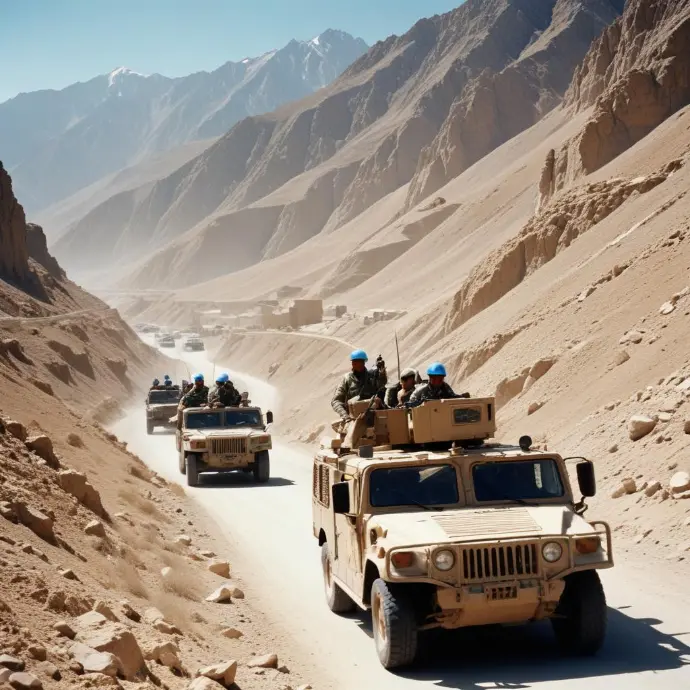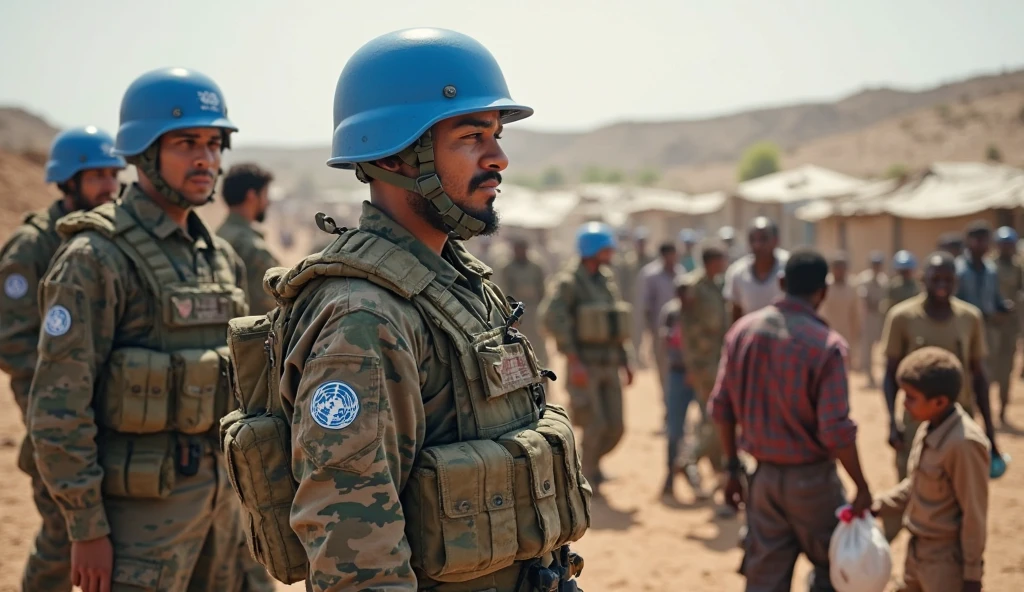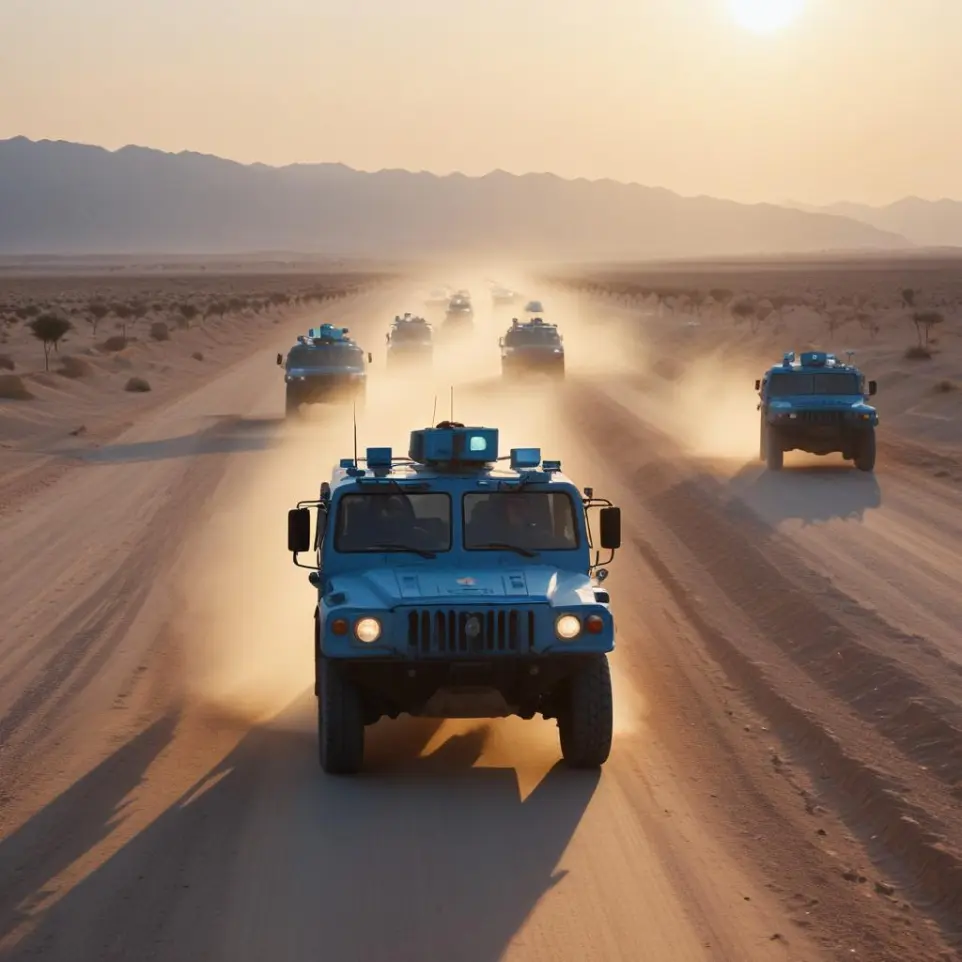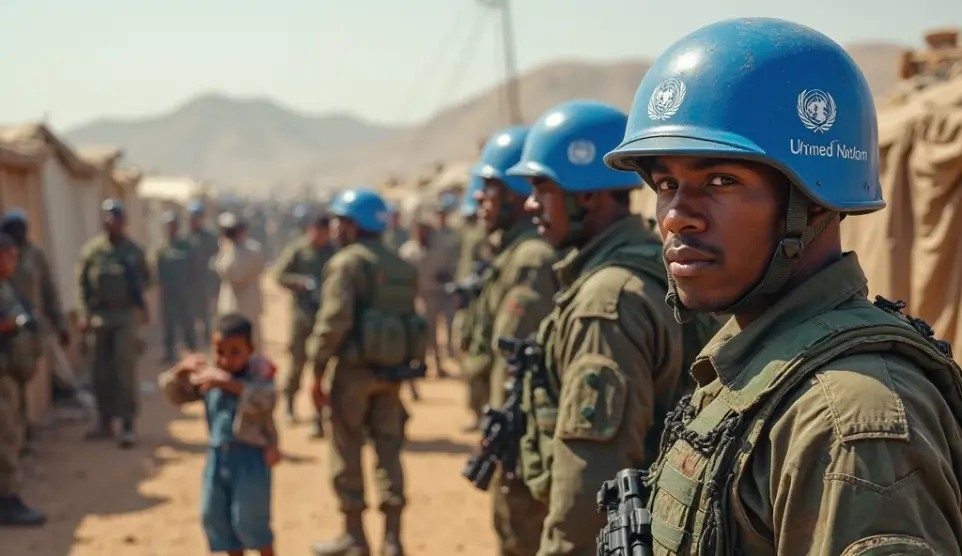The Function of Blue Helmets: Defenders or Abusers of Human Rights?
More information about Human Rights More information about Rights in Armed Conflict
Welcome to a space dedicated to an in-depth exploration of human rights at the global level. In our featured article, "The Role of Blue Helmets: Defenders or Abusers of Human Rights?", we analyze the essential role of peacekeepers in protecting rights during armed conflict. Ready to delve deeper into this captivating topic? Join us and immerse yourself in a world of reflection and analysis on human rights in conflict situations.
Introduction
The Blue Helmets are United Nations peacekeeping forces, composed of military and civilian personnel from different countries. Their primary function is to establish and maintain peace in conflict areas, as well as to protect civilians in war situations. The name "Blue Helmets" derives from the color of the helmets they wear as part of their distinctive uniform.
These peacekeepers are deployed by the UN to carry out missions that include monitoring ceasefires, protecting civilians, promoting human rights, assisting in the demobilization of combatants, and other tasks related to peacebuilding.
The Blue Helmets represent a symbol of hope for populations affected by armed conflict, as their presence seeks to ensure a safer environment and protect the fundamental rights of people caught in the conflict.
The history of the Blue Helmets dates back to the creation of the United Nations in 1945, when peacekeeping was established as one of the organization's fundamental pillars. The first deployment of Blue Helmets took place in 1948, when the UN sent military personnel to the Middle East to monitor the ceasefire between Israel and its Arab neighbors.
Since then, the Blue Helmets have participated in numerous peacekeeping missions around the world, deploying to conflicts such as Cyprus, Congo, Rwanda, Bosnia, East Timor, Haiti, Darfur, among others. Their work has been marked by moments of success as well as challenges and criticism, especially regarding the protection of human rights in the places where they operate.
While their presence has been essential to the cessation of hostilities in many regions, they have also faced complex situations in which human rights violations have been a constant concern.
The role of Blue Helmets in the protection of human rights is vital, as their presence seeks to ensure respect for the fundamental principles of human dignity and the protection of life and the integrity of persons in conflict zones. Despite challenges and criticism, their work has been crucial in preventing conflict, supporting reconciliation, and promoting human rights in extremely complex environments.
The protection of human rights is a central aspect of United Nations peace operations, and Blue Helmets play a fundamental role in implementing this work. However, it is important to recognize that their performance has been subject to scrutiny, with allegations of abuses and violations by some contingents in various peacekeeping missions.
In this regard, it is crucial that continued efforts be made to improve the training, supervision, and accountability of Blue Helmets, in order to ensure that their work focuses on the protection of human rights and respect for international law.
The Role of Blue Helmets in the Protection of Human Rights
The United Nations Blue Helmets, the peacekeeping forces of the United Nations, play a crucial role in protecting human rights in areas of armed conflict around the world. Their primary mission is to maintain international peace and security, which includes the protection of civilians caught in the middle of violent confrontations. Through observation, mediation, and, occasionally, the use of force, the Blue Helmets seek to mitigate conflicts and protect the human rights of the affected population.
An analysis of the Blue Helmets' work reveals that their presence has been instrumental in reducing the intensity of armed conflicts in many regions. Their active participation in resolving disputes, protecting safe areas for civilians, and monitoring peace agreements has significantly contributed to reducing violence and protecting human rights in situations of armed conflict.
It is important to emphasize that, while their work is essential, they also face various challenges and criticisms in the conduct of their activities, which requires a thorough assessment of their impact on the protection of human rights in specific contexts of armed conflict.
The presence of the Blue Helmets in zones of armed conflict has had a significant impact on the protection of the civilian population. Their deterrent presence has contributed to the reduction of violence and provided a sense of security to communities that would otherwise be exposed to serious human rights violations. Furthermore, their work in mediating local conflicts has led to the reduction of tensions and the promotion of a more peaceful and secure environment for the affected population.
In many cases, the presence of the Blue Helmets has facilitated humanitarian access to vulnerable communities, enabling the distribution of lifesaving assistance, including food, medicine, and shelter. This has been critical in ensuring the survival and well-being of the civilian population amid humanitarian crises caused by armed conflict.
It is important to recognize that, while their work has had a positive impact on the protection of civilians, reports of abuses and inappropriate conduct by some Blue Helmets missions have also emerged, raising criticism and questions about the effectiveness of their work in protecting human rights.
Blue Helmets face a number of challenges and limitations in their humanitarian work, which directly impact their ability to protect human rights in areas of armed conflict. These challenges include a lack of resources and personnel, the complexity of local conflicts, hostility from the parties to the conflict, and a lack of a clear mandate in certain situations.
Furthermore, the safety of Blue Helmet personnel is a constant concern, as they face extremely dangerous environments and, in many cases, are the targets of direct attacks. This situation limits their ability to deploy effectively in areas where immediate human rights protection is required.
Addressing these challenges and limitations is critical to strengthening the Blue Helmets' work in protecting human rights in situations of armed conflict, ensuring that they have the necessary resources and international support to carry out their mission effectively and in a manner that respects human rights.
The Blue Helmets, also known as the United Nations peacekeeping forces, have played a crucial role in protecting human rights in various conflict zones around the world. Among the concrete actions they have carried out are the protection of civilians in conflict areas, monitoring and verifying respect for human rights, promoting dialogue and mediation for the peaceful resolution of conflicts, and assisting in the reconstruction of war-affected communities.
First and foremost, the Blue Helmets have actively worked to protect the civilian population in conflict areas, providing security and preventing attacks against innocent civilians. Their presence has been instrumental in deterring violence and protecting those in vulnerable situations during armed conflict.
Furthermore, they have played a crucial role in monitoring and verifying respect for human rights in conflict zones. This involves documenting and reporting human rights violations, as well as overseeing compliance with international agreements and treaties aimed at protecting civilians in situations of armed conflict.

Criticism and Controversy Surrounding the Role of the Blue Helmets
The Blue Helmets, the United Nations peacekeeping forces, have been the subject of accusations of human rights violations in various missions around the world. These accusations have generated controversy and raised questions about the role of these forces in protecting human rights.
Allegations of human rights violations by the Blue Helmets have arisen in various contexts, ranging from sexual abuse to excessive use of force in peacekeeping operations. These accusations have generated intense debate about the effectiveness and ethics of Blue Helmet operations, as well as the United Nations' responsibility to oversee and hold these forces accountable.
The nature of these accusations has led to increased scrutiny of Blue Helmet operations and has posed significant challenges to public perceptions of these forces and their role in protecting human rights globally.
Investigations into human rights violations involving Blue Helmets have revealed landmark cases that have generated significant international concern. One of the most notorious cases was the Blue Helmet sexual abuse scandal in Haiti, which sparked outrage and calls for stronger action by the United Nations.
Furthermore, cases of excessive use of force in peacekeeping operations have been documented, leading to criticism of the training and control of Blue Helmet forces on the ground. These landmark cases have contributed to negative perceptions of Blue Helmet operations and posed significant challenges to the legitimacy of these forces in the context of human rights.
The revelation of these emblematic cases has highlighted the need for greater transparency and accountability in Blue Helmet operations, as well as a more rigorous approach to protecting human rights in the context of United Nations peacekeeping missions.
Allegations of human rights violations related to Blue Helmets have had significant international repercussions, undermining the credibility and legitimacy of these peacekeeping forces. These allegations have generated distrust and skepticism about the Blue Helmets' ability to effectively protect human rights in conflict and post-conflict contexts.
Furthermore, allegations of human rights violations have led to increased scrutiny of Blue Helmet operations and raised challenges for United Nations oversight and control of these forces. These repercussions have highlighted the need for significant reforms in Blue Helmet operations, as well as a stronger focus on protecting human rights in the context of peacekeeping missions.
Reports of human rights violations by Blue Helmets have had a profound impact on the debate about the role of these forces in protecting human rights globally, generating calls for greater transparency, accountability, and reform in United Nations peacekeeping operations.
The Global Debate on the Performance of the Blue Helmets
The role of the UN Blue Helmets has been the subject of intense debate regarding their effectiveness in protecting human rights in conflict zones. Those in favor argue that their presence has contributed to the reduction of violence and protected innocent civilians from abuses and atrocities. Their work in monitoring peace agreements and the disarmament of armed groups, as well as their participation in humanitarian relief and reconstruction operations, is highlighted.
On the other hand, their critics argue that the Blue Helmets have been responsible for human rights abuses, including cases of sexual exploitation and abuse, as well as acts of violence against civilians. They are accused of inaction in emergency situations and of not having adequate training and resources to effectively address challenges on the ground.
This debate over the role of the Blue Helmets in protecting human rights continues to generate controversy and raises questions about their true impact in zones of armed conflict.
In response to criticism and concerns regarding the performance of the Blue Helmets, various reforms and measures have been proposed to improve their performance in situations of armed conflict. These proposals include a greater emphasis on human rights training and the protection of civilians, as well as the implementation of stricter protocols to prevent and punish abuses by peacekeepers.
Furthermore, the need to strengthen coordination and communication between the Blue Helmets and local communities, as well as to increase the participation of women in peacekeeping operations, has been raised. It has also been suggested that peacekeeping missions be provided with the necessary resources to fulfill their mandates, including logistical, technological, and intelligence capabilities.
The analysis of these reforms and proposed measures seeks to ensure that the Blue Helmets can carry out their work effectively and respectfully for human rights in armed conflicts worldwide.
International organizations and NGOs have expressed different positions regarding the role of the Blue Helmets in the protection of human rights. Some organizations have recognized the efforts of the Blue Helmets in conflict prevention and the protection of civilians in war zones, while others have denounced cases of abuses and violations committed by peacekeepers.
These organizations have advocated for the implementation of structural reforms that strengthen accountability and transparency in Blue Helmet operations, as well as for the empowerment of local communities to participate in decision-making that affects their safety and well-being.
An analysis of these organizations' positions offers a broad and diverse view of the role of the Blue Helmets in protecting human rights, as well as the areas for improvement that must be addressed to ensure their effectiveness and respect for fundamental rights in armed conflicts.
Conclusions
The role of Blue Helmets in the protection of human rights has been the subject of intense debate over the years. While their presence has contributed to conflict prevention and the protection of civilians in many settings, they have also faced accusations of abuse and exploitation. It is crucial to recognize that while some Blue Helmet contingents have demonstrated exemplary commitment to defending human rights, others have been responsible for serious violations.
It is essential to consider that, in many cases, Blue Helmets have operated in extremely complex contexts, facing significant operational and political challenges. Despite this, it is imperative to maintain constant scrutiny of their actions to ensure that they comply with the highest standards of respect for human rights in all circumstances.
Ultimately, it is necessary to recognize both the achievements and failures of the Blue Helmets in their role as protectors of human rights, and to work toward the implementation of more effective accountability mechanisms to ensure they fulfill their mandate fairly and equitably.
The work of the Blue Helmets in the defense of human rights globally is undoubtedly a complex issue that requires a multidimensional approach. Throughout their history, both successes and challenges have emerged regarding their contribution to the protection of human rights in contexts of armed conflict.
It is essential to recognize that, while the Blue Helmets have been criticized on multiple occasions, their work has been fundamental in preventing conflict, supporting peacebuilding, and protecting civilians in situations of extreme vulnerability. However, it is crucial to implement more effective mechanisms to address allegations of abuse and exploitation, thus ensuring that their actions adhere to the highest standards of respect for human rights.
Ultimately, the debate surrounding the role of Blue Helmets in defending human rights must be approached with perspective and balance, recognizing both their positive contributions and areas in need of improvement. Only through rigorous analysis and critical evaluation can we move toward a future in which Blue Helmets play an even more effective and respectful role in protecting human rights globally.




The role of Blue Helmets in protecting human rights is more relevant than ever today, as their work has a direct impact on the lives of millions of people around the world. It is essential to reflect on the impact of Blue Helmets on protecting human rights and consider how each individual can contribute to promoting peace and justice in their communities. Commitment to defending human rights is a collective task that requires courage and empathy, and each person has the power to make a difference in their community and beyond.

 IHRO NEWS
IHRO NEWS